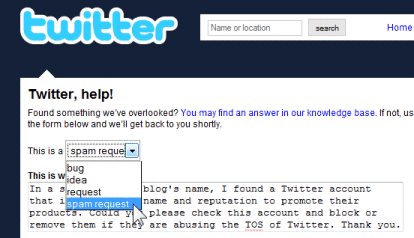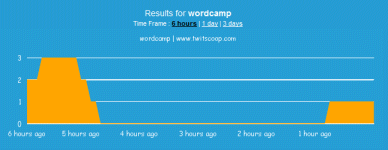Twitter Searches, Twams, and Twogs
 Have you searched for comments about you or your blog on Twitter? Have you ever wondered what people are saying about you?
Have you searched for comments about you or your blog on Twitter? Have you ever wondered what people are saying about you?
There is a lot you can learn by searching Twitter and monitoring popular keywords and topics. For following trends, it’s invaluable.
How to Track Keywords and Search Terms in Twitter
There are a variety of ways to track what people are saying about you and other topics. Twitscoop tracks the most popular keywords on Twitter, and features a search option. It returns a summary of the latest tweets with those terms. You can click a link to get a chart displaying the frequency and timing of the search term, giving you a visual image of the rise and fall of specific terms on Twitter.
Tweetscan continues to be a favorite of many, though I’ve had fun with Twitter100 and Quotably, the latter which helps track Twitter conversations better than you can in your Twitter panel, through Twirl, and other Twitter applications. Sometimes learning about what people are really saying involves tracking the conversation, not just the tweets.
Monitter is a live Twitter monitor. Type in three keywords in the chart under the intro and it will sort through and report on the most recent tweets with those words. There are various options to restrict the results.
Here are some options for tracking what people are saying on Twitter about your or specific terms:
- Twitter Search (formerly Summize)
- Twitter100
- Quotably
- Tweetscan
- Google Special Twitter Search
- Monitter
Some Twitter services search for tags and keywords which can also help you find the most common and popular words of interest for generating blog content stories and articles and help you watch trends. Some of these tools also allow searches. They include:
What are they saying about you on Twitter? Hmmm?
I searched recently and had fun seeing all the different things people said when mentioning me or my work, including someone who said they didn’t like linking to me because I was over-linked. How can you be over-linked? How do you know if someone is over-linked? Who decides? It was great fun until I noticed that someone was twittering a lot about me and my blog, and I didn’t like what they were doing nor saying.
They weren’t saying unkind things. There are always “those” bits that make you uncomfortable. That’s to be expected. This was worst. They were using my blog’s name and reputation to promote their commercial WordPress products.
In my mind, this is Twitter spam. Twitter splog. Or is it Twam? A Twog?
How to Report Twitter Spam
Either way, if you find a Twitter account that is abusive, commercial, or violating Twitter’s Terms of Service, how do you report it?
I contacted Twitter Help and reported my findings. You can also contact them by email at [email protected]. It is part of their Terms of Service to not permit defamatory, libel, or objectionable content, which also includes spam. Within a few days, they contacted me to report that indeed the Twitter account is classified as spam and they’ve frozen the account while they investigate further and make a final judgment.

They also gave me instructions on blocking a profile account if I find their content objectionable and don’t want to support it by association. On the profile page of the person you wish to block, click Block in the sidebar and confirm the option. They also pointed me towards their recent Twitter Limit Policy that stopped abuses by splogs and spammers which were hammering Twitter with too many tweets.
Their actions to shut down this account are fine examples of customer service, but blocking doesn’t stop the spammer. It just stops your access to the Twitter content. They can still spam, you just don’t see it and they can’t see you. According to their support articles and Twitter FAQ page:
Once you block someone, you will not appear on the person’s profile page, nor will they appear on yours. They will not be notified, and will be unable to send your friend requests in the future.
You can unblock a person by clicking “unblock” from their profile page.
Note: if your profile is public, they will still be able to go to your profile page and view your public updates. However, blocked parties cannot receive your updates on phone or IM. You can always protect your profile for the utmost privacy.
Does Twitter count how many people have blocked a specific Twitter account? Does 10 blocks trigger a flag and inquiry? If promoted right, this could be a good way to help Twitter target and clean up Twitter twams and twogs, if the community use it wisely in the best interest of the community. There must be some accountability and a way for the community to help fight off the nasties in Twitter.
Whether or not you are on Twitter, take time to search through to see what is being said about you. There isn’t much you can do when people say negative things, but if someone is abusing your good name, especially in violation of Twitter’s Terms of Service, help the Twitter community benefit by reporting Twitter spammers. They might be targeting more than just you.
So what are they saying about you on Twitter? Only good things, I’m sure.
The author of Lorelle on WordPress and the fast-selling book, Blogging Tips: What Bloggers Won't Tell You About Blogging, as well as several other blogs, Lorelle VanFossen has been blogging for over 15 years, covering blogging, WordPress, travel, nature and travel photography, web design, web theory and development extensively as web technologies developed.



Very thorough article! Tracking your name/brand is so important.
However, don’t stop at Twitter! You’ll also want to track mentions on Identi.ca, the new open source microblogging system. You can do this using the IdentiSpy bot or by subscribing to RSS feeds of searches. (More details at http://ohidentica.com).
Setting up Google Alerts at http://www.google.com/alerts or subscribing to the RSS feeds of Technorati searches will also catch mentions of your keywords across the web and on blogs in real-time.
I’ve been looking for the best methods for tracking keywords and search terms in Twitter and I think I’ve just found them all in one place. Great article. Many thanks.